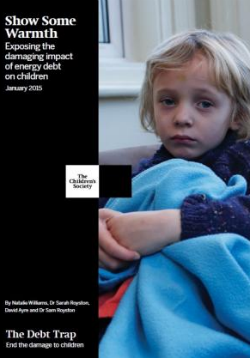Energy companies 'failing' vulnerable families
Energy companies are failing huge numbers of families struggling with energy debt, causing parents to feel intimidated and damaging children’s health, according to new research from The Children’s Society
Almost a million children are living in families in energy debt and too often energy companies are not following their legal obligations to help these families, The Children's Society has claimed.
Its new report published on Thursday (22 January) showed that an estimated 500,000 families with children who have faced energy debt said they were not being given an option over the amount of money they pay back each month.
Energy companies are legally required to make sure they assess how much families can realistically afford to repay. They are also required to make it easy for customers to raise concerns. Far too often this is not happening, according to the research.
 ‘Show Some Warmth: Exposing the damaging impact of energy debt on children’ found that four in 10 UK families with dependent children who faced energy debts felt intimidated by their energy company and that nearly half (48 per cent) of these families reported that they were not treated with respect or given the support they needed.
‘Show Some Warmth: Exposing the damaging impact of energy debt on children’ found that four in 10 UK families with dependent children who faced energy debts felt intimidated by their energy company and that nearly half (48 per cent) of these families reported that they were not treated with respect or given the support they needed.
The result is that families are suffering because of energy companies’ "damaging debt practices", The Children's Society said.
Children in families that have faced this type of debt are significantly more likely to become ill in winter. Four in ten children in these families said they had trouble sleeping because their bedroom was too cold. Over half of parents in debt on their energy bills suffer from stress, anxiety or depression.
The report was based on a representative survey of around 2,500 UK families, interviews with eight families in energy debt conducted by The Children's Society, and analysis of the latest official statistics from the English Housing Survey. The research found that nearly one in five families - representing 1.3 million families with 2.2 million children - have been in energy debt at some point. Energy debt is when a household falls behind on its energy payments.
The report coincides with the launch of The Children’s Society’s Show Some Warmth campaign, which, as part of its ongoing Debt Trap campaign, is highlighting the damaging effects that energy debt has on children’s lives.
The report shows how all companies have good and bad energy debt practices. But no energy company is taking all the steps they should to protect children from the damaging effects of debt.
According to those who responded to the survey, the highest proportion of parents in energy debt said that of the ‘big six’, npower was particularly poor at being supportive and respectful. EDF topped the list in being supportive, followed by SSE.
Matthew Reed, Chief Executive of The Children’s Society, said, 'Huge numbers of families are struggling to make ends meet, yet energy companies are making them the victims of their damaging debt practices. They urgently need to show some warmth and stop failing vulnerable children.
'Energy companies across the board need to follow their agreements to work with, not against, families in energy debt and find decent solutions. No child should be made to grow up in a cold home because their parents are trapped in an energy debt trap.'
Urgent changes are needed to help these families, he continued.
It is "vital" the Government changes the law so energy companies treat families with children as vulnerable customers and makes sure those who have been put on pre-payment meters because they are in debt, do not pay more for their energy as a result.
Energy companies need to negotiate affordable debt repayment plans, it continued, including lowering or suspending debt repayments over the winter, when children’s health is most at risk.
They also need to review staff training procedures, targets and call scripts so a flexible approach is taken with families. Energy companies should also offer a free helpline that customers can call from a mobile phone to raise concerns.
Baptist Times, 22/01/2015